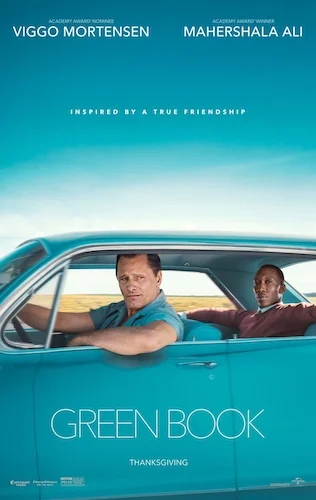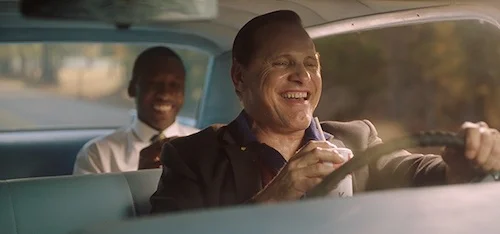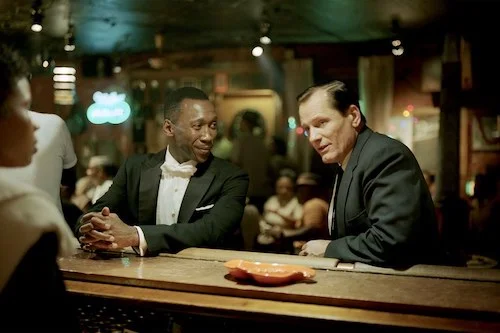Green Book
Ironically, for a film about driving, Green Book has to be one of the most pedestrian films of 2018. It is true to form when it comes to personifying lead character Tony “Lip” Vallelonga: it gets by, and that’s about it. This biopic is a major turn around for the usually-crass Peter Farrelly (of the notorious Farrelly brothers duo), so comparing this film to Hall Pass, Shallow Hal, Stuck on You, or — heaven forbid — Movie 43 is going to be far too easy; it will look like Citizen Kane in comparison. But that’s the very problem: it isn’t Citizen Kane. it doesn’t need to be, but let’s just say that far too much in Green Book is worthy of constructive discussion for it to truly be a hot contender for film of the year.
Bad news: The film is very similar to Driving Miss Daisy. Good news: It is still leagues better than Driving Miss Daisy, although it definitely shares a similar level of inoffensiveness. We have an interesting story about a bodyguard-turned-chauffeur named Tony Lip (a recognizable name for any gangster film aficionados, thanks to his many involvements in ‘80s, ‘90s and ‘00s flicks and shows). He begrudgingly agrees to take musician Don Shirley across the southern states during the bigoted ‘60s. Let’s be fair. The film is lots of fun, with a little bit of a serious discussion on the kinds of racism Shirley has to endure on an hourly basis.
Viggo Mortensen and Mahershala Ali in a scene for Green Book.
That’s kind of the major problem with Green Book. It tends to gloss over every little thing. We know almost nothing about Shirley as a person, and he is treated as this mystical figure who has no familial relations to share with (which, we have learned through interviews with his surviving family members, is a lie). This decision would make sense if it enhanced the film, but it does no such thing. This hyper-flat character is saved by a brilliant performance by Mahershala Ali, who uses the untouchable traits of Shirley in the script to render this character wise and not invincible. We do see the various types of racism that Shirley puts up with, and that’s the one area the film willingly dives deep(ish) into (outside of Shirley’s actual musical talents).
Then there’s Tony Lip, who goes from repugnantly racist (how dare a person of colour not know who Little Richard is or eat fried chicken) to being very tolerant (fighting for Shirley’s right to eat at a dinner table) at the drop of a hat. Do I expect Lip to not have a change of heart? No, but I think a more gradual transition would make more sense. No one just flips overnight; when I say flip, I mean Lip honestly changes character traits entirely. Not to compare this film to Schindler’s List (because no film is Schindler’s List), but that character had a glacial turn from nazi member to haven creator, and you still saw flaws that he had in character even during his biggest shifts. There is no depth in Green Book; only the flat road that these two characters fly across.
A scene from Green Book.
It’s not all bad, though. It is at least a humorous film with its light hearted jokes about an inherently intolerant man trying to see a new light through a person of colour. There are nice cues for each movement: when a scene is feel-good, or when it is something a little sadder. Of course, it isn’t always nice to be told how to feel by a film, but Green Book at least mood shifts consistently. I just wish there was more actual construction underneath the floorboards here. Even the ending credits come directly after a chuckle-worthy joke with no real grandiose dismount or any sort of true closure. I know I just said that a film shouldn’t have to guide you with how to feel, but wouldn’t it make sense for a film that is holding you by the hand to at least show you out the door? Nope. Joke happens; cut to after-effects laden credits. At least after a heart-filled journey, there should be a better farewell.
Anyways, we’re supposed to be pointing out the good things here. I’ll get back on track. You do get a small taste of what the story is going for, and that’s fine, I suppose. The recreation of the ‘60s is always nice to experience, and Farrelly and company do do this well. Colours are used in a seemingly rich way (nothing too overpowering), especially the teal colour that dominated that era’s cars, neon lights, clothes and such. This film operates squarely on positivity and comfort, and there is nothing wrong with that.
It does come off as a nice conversation; I just wish it was a full on discussion. In 2018 (2019 now), a more meaningful dialogue about race issues would have been better. Knowing very little about these characters (outside of Tony having inter-personality issues and a loving family, and Shirley being a musician that has to fight against racism) just makes this a bullet-point list of the ways racism are bad, and not a soul search. Everything is saved by the chemistry of the two leads: Mortensen plays a likeable tank that means well but clunks around, and Ali brings an otherworldly quality to both Shirley and the film. However, imagine how much stronger everything would be if we were truly let into both of their lives? The film could afford an extra twenty minutes to character build, world build (outside of the rolling shots of the American countrysides and city life), and at least have a less rushed ending. Green Book is kind and sweet, but it just isn’t enriching as it could have been. It isn’t as insanely lazy as Driving Miss Daisy, but it being even remotely comparable to that film is a problem enough.
Andreas Babiolakis has a Masters degree in Film and Photography Preservation and Collections management from Ryerson University, as well as a Bachelors degree in Cinema Studies from York University. His favourite times of year are the Criterion Collection flash sales and the annual Toronto International Film Festival.






